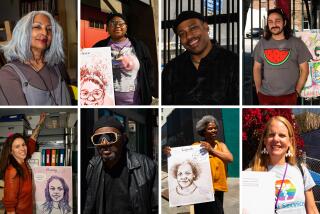Formerly homeless, they know whereof they speak
Don’t just walk by quickly, looking straight ahead.
If you notice a person living on the street, don’t pretend you don’t.
That’s what Victor Rodriguez chose to say to a group gathered downtown one evening last week to hear from people who once were homeless and who know how it feels not to be seen.
Rodriguez, 52, now lives in the Dewey Hotel Apartments, operated by the Skid Row Housing Trust, which develops and manages affordable housing in an effort to provide homes for the homeless.
He is one of a group of the trust’s residents who signed up this year to be trained as Trust Ambassadors.
They studied storytelling, learned public speaking — all with the aim of sharing their hard-earned wisdom far and wide. To those who have never been homeless, they can speak about how quickly it can happen. To those who are homeless, they can talk about ways to climb out and regain security.
“We created this program because we’re often asked at the trust to provide information about skid row and about homelessness downtown, and for a long time we felt that we were doing an injustice by speaking for the community when we knew that we had so many residents who were very capable of speaking for themselves,” Molly Rysman, the trust’s director of external affairs, said in introducing the evening’s program at the Last Bookstore at 5th and Spring streets.
On this night, in a part of downtown where the poor and the privileged very much coexist, the speakers stood on a low wooden stage before an audience of about two dozen.
In a crisp beige shirt and beige trousers, Rodriguez gripped the microphone with both hands, speaking into it low and confessionally.
He grew up in the suburbs, went to Catholic school, got himself a job at the telephone company. Then he lost the job and the slide began.
“Everything was good and then it all shattered,” he said — and he became one of the people passers-by walk by on skid row.
“Take time to give somebody a chance, give somebody some dignity. Say hello. Say good morning,” Rodriguez said. And as he spoke, support from the room — “Mmm-hmmm,” “That’s right” — washed over his words in warm waves.
Paul Mitchell, 54, who now lives in the Olympia Hotel Apartments, was homeless for close to 20 years. Most of those years, he told the group, he didn’t really understand why.
His father worked. His mother worked. Why was steady work something that slipped out of his grip?
Finally, he said, he found his way to a mental health counselor, who told him there was more going on.
“Try going for weeks and months and years without proper sleep. You’d be a lunatic. You’d be mental,” said this tall, dignified man in a black suit. “Your brain is just this thing exploding in water, that doesn’t want to work.… Getting therapy and getting help just really helped me out.”
Steve Hatter, 52, who is legally blind, spoke of a rootless life that, like other lives, started securely in the suburbs. He described heading west after spinning a Diet Coke can and seeing in what direction its top pointed. One desperate day in Los Angeles, he said, he popped a lot of pills and collapsed in what he thinks was Hollenbeck Park.
Someone saw him fall and called 911, which led to life-saving antidepressants and a roof over his head.
“By having that stability, I could overcome a lot of different things,” he said, including being told that his eyesight was failing.
Theresa Winkler said she got back 11 years when she found her way off the streets. She’d been on her own since she was 12 — a prostitute and an addict. She was living in a bush without money to buy a cigarette when she decided she might as well head downtown.
She found the Skid Row Housing Trust, which began to find her help — starting with locating her birth records. She’d thought she was 53. The records showed she was 42.
She got the years back. She got a Social Security card. She got an apartment. She got clean.
As a Trust Ambassador, she says, she has set a new goal.
“I want to speak to women that are just like me and I want to speak to young women, so they don’t become what I was.”
More to Read
Sign up for Essential California
The most important California stories and recommendations in your inbox every morning.
You may occasionally receive promotional content from the Los Angeles Times.











